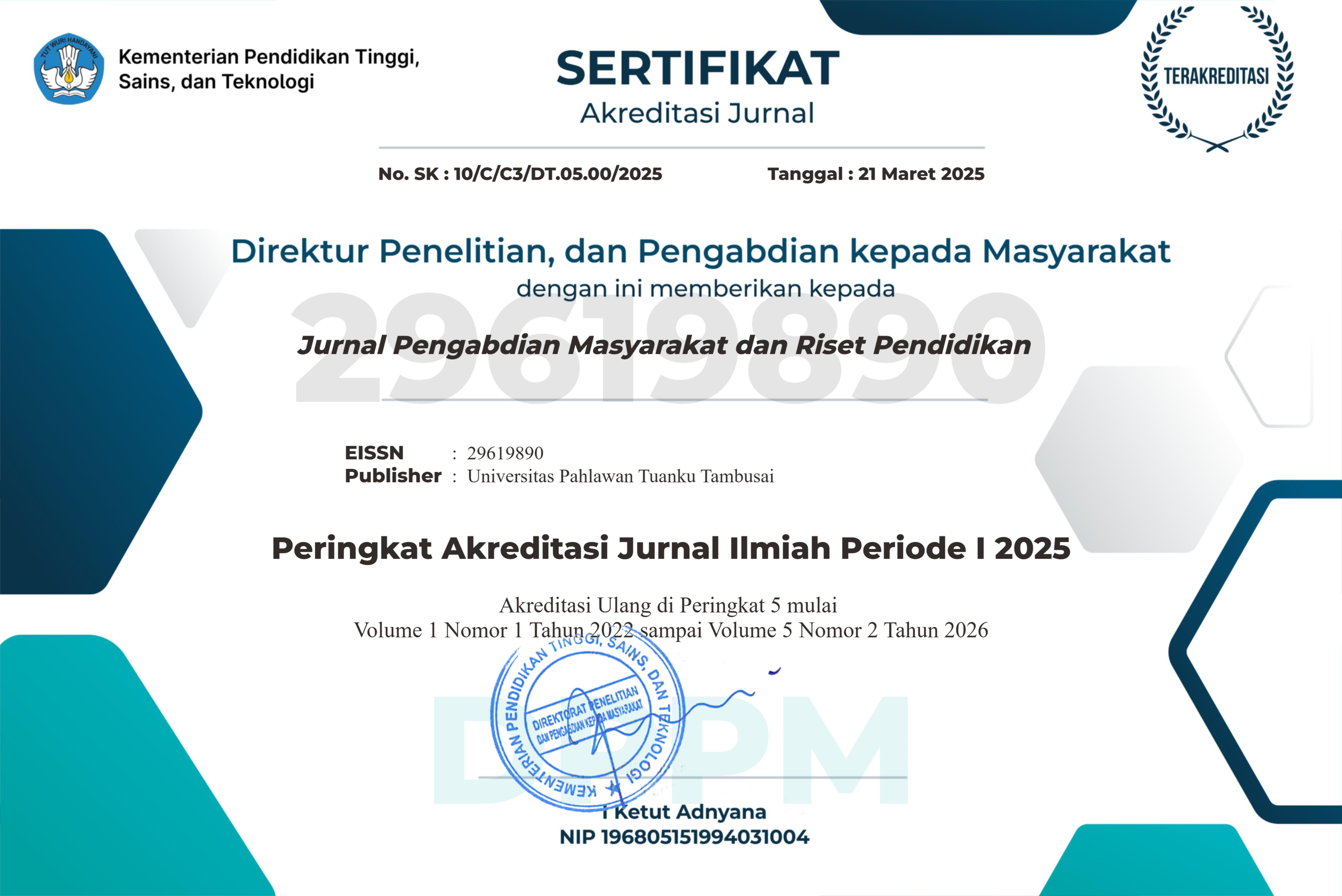Pemanfaatan Game Based Learning dan Gamifikasi Adaptif dalam Pembelajaran STEM
Penelitian
DOI:
https://doi.org/10.31004/jerkin.v4i2.3419Keywords:
Game-Based Learning, Adaptive Gamification, STEM, Learning Motivation, Kurikulum MerdekaAbstract
The 21st-century education paradigm demands that students master critical thinking, collaboration, communication, and creativity skills (4C), which align with the Science, Technology, Engineering, and Mathematics (STEM) approach. However, the implementation of STEM education in Indonesia still faces challenges such as low student motivation, engagement, and problem-solving abilities. This study aims to examine the potential of utilizing Game-Based Learning (GBL) with adaptive gamification as an innovative strategy to overcome these obstacles. A qualitative research method was employed through a literature study approach, drawing data from national and international journal articles, conference proceedings, and academic books published within the last 5–10 years. Data were collected through academic database searches (Scopus, Google Scholar, DOAJ, and Sinta) and analyzed using content analysis techniques involving reduction, categorization, and synthesis of findings. The results indicate that GBL can enhance students’ intrinsic motivation, engagement, and academic performance in STEM learning, particularly when designed with authentic, adaptive, and reflective elements. The identified advantages include increased motivation, personalized learning, and improved problem-solving skills, whereas the limitations involve infrastructural readiness, teacher competence, and potential design-related distractions.
References
Abdi, A., Aristya, P. D., & Budiarso, A. S. (2023). Pengembangan modul flipbook digital berbasis stem materi sistem pencernaan manusia untuk meningkatkan literasi sains. LENSA (Lentera Sains): Jurnal Pendidikan IPA, 13(1), 57–66. https://doi.org/https://doi.org/10.24929/lensa.v13i1.294
Adiyono, A., Rahayu, A. P., Besari, A., Wahib, A., Arianti, S., & Kojin, K. (2025). AI-Driven Personalized Learning Paths: Enhancing Student Engagement Through Gamification and Interdisciplinary Integration. 2025 5th International Conference on Artificial Intelligence and Education (ICAIE), 604–612. https://doi.org/https://doi.org/10.1109/ICAIE64856.2025.11158040
Bahari, A. (2019). FonF practice model from theory to practice: CALL via focus on form approach and non-linear dynamic motivation to develop listening and speaking proficiency. Computers & Education, 130, 40–58. https://doi.org/https://doi.org/10.1016/j.compedu.2018.11.009
Blasco-López, C., Busó, P., Mentini, L., Silvi, S., Fusconi, F., Pocaterra, C., Marinelli, S., Albertini, S., Vavassori, V., & Ferrini, L. (2025). EDUCATIONAL GAMES FOR BIOECONOMY LEARNING: INSIGHTS FROM THE HORIZON EUROPE GENB PROJECT. INTED2025 Proceedings, 4640–4649. https://doi.org/https://doi.org/10.21125/inted.2025.1158
Bybee, R. W. (2013). The case for STEM education: Challenges and opportunities.
Cabarlo, J. B., Camposagrado, C. G. P., Casipit, A. A., Casipit, L. P., & Suniga, J. J. S. (2025). Seasharp: Gamifying C# Programming Education for Engaging Learning. International Journal of Latest Technology in Engineering, Management & Applied Science, 14(1), 307–312.
Caratozzolo, P., Chans, G. M., & Dominguez, A. (2025). Continuing engineering education for a sustainable future. Frontiers in Education, 10, 1629507. https://doi.org/https://doi.org/10.3389/feduc.2025.1629507
de-Marcos, L., Domínguez, A., Saenz-de-Navarrete, J., & Pagés, C. (2014). An empirical study comparing gamification and social networking on e-learning. Computers & Education, 75, 82–91. https://doi.org/https://doi.org/10.1016/j.compedu.2014.01.012
Fithri, S., Tenri Pada*, A. U., Artika, W., Nurmaliah, C., & Hasanuddin, H. (2021). Implementasi LKPD Berbasis STEM untuk Meningkatkan Keterampilan Berpikir Kritis Peserta Didik. Jurnal Pendidikan Sains Indonesia, 9(4), 555–564. https://doi.org/10.24815/jpsi.v9i4.20816
Gui, Y., Cai, Z., Yang, Y., Kong, L., Fan, X., & Tai, R. H. (2023). Effectiveness of digital educational game and game design in STEM learning: a meta-analytic review. International Journal of STEM Education, 10(1). https://doi.org/10.1186/s40594-023-00424-9
Hamari, J., Koivisto, J., & Sarsa, H. (2014). Does gamification work? - A literature review of empirical studies on gamification. Proceedings of the Annual Hawaii International Conference on System Sciences, 3025–3034. https://doi.org/10.1109/HICSS.2014.377
Hidayatullah, W. N. (2024). Jurnal Penelitian Pendidikan Matematika dan Sains ( STEM ) dalam Meningkatkan Kemampuan Literasi Sains Pada Materi Redoks. 8(2). http://journal.unesa.ac.id/index.php/jppms/
Iriani, R., Rusmansyah, R., Analita, R. N., Leny, L., & Salsabila, I. Z. (2024). Pengembangan Media Pembelajaran Live Streaming Berbasis Website Menggunakan Model Blended Learning Untuk Melatihkan Keterampilan Berpikir Kritis. JCAE (Journal of Chemistry And Education), 7(2), 79–91. https://doi.org/10.20527/jcae.v7i2.2590
Maryam, I. (2022). Implementasi Blended Learning Terintegrasi Stem Untuk Meningkatkan Kemampuan Berpikir Kritis Mahasiswa. Jurnal Eduscience, 9(2), 469–481. https://doi.org/10.36987/jes.v9i2.3036
Monterrat, B., Desmarais, M., Lavoué, E., & George, S. (2015). A player model for adaptive gamification in learning environments. International Conference on Artificial Intelligence in Education, 297–306.
Ronzon, T., Gurria, P., Carus, M., Cingiz, K., El-Meligi, A., Hark, N., Iost, S., M’barek, R., Philippidis, G., van Leeuwen, M., Wesseler, J., Medina-Lozano, I., Grimplet, J., Díaz, A., Tejedor-Calvo, E., Marco, P., Fischer, M., Creydt, M., Sánchez-Hernández, E., … Miras Ávalos, J. M. (2025). PSYCHOLOGICAL AND PEDAGOGICAL CONDITIONS FOR THE FORMATION OF SUSTAINABLE LEARNING MOTIVATION IN PRIMARY SCHOOL LEARNERS. Sustainability (Switzerland), 11(1), 1–14. https://bulletennauki.ru/gallery/112_63.pdf.
Savolainen, I., Oksanen, A., Kaakinen, M., Sirola, A., Zych, I., & Paek, H. J. (2021). The role of online group norms and social identity in youth problem gambling. Computers in Human Behavior, 122, 106828. https://doi.org/10.1016/j.chb.2021.106828
Subhash, S., & Cudney, E. A. (2018). Gamified learning in higher education: A systematic review of the literature. Computers in Human Behavior, 87, 192–206. https://doi.org/https://doi.org/10.1016/j.chb.2018.05.028
Trilling, B., & Fadel, C. (2009). 21st century skills: Learning for life in our times. John Wiley & Sons.
Tsai, Y., Poquet, O., Gašević, D., Dawson, S., & Pardo, A. (2019). Complexity leadership in learning analytics: Drivers, challenges and opportunities. British Journal of Educational Technology, 50(6), 2839–2854.
Wahyudini, A. I., Prianto, M. H., & Yuliana, I. (2025). Pengembangan Media Pembelajaran Komik Digital Berbasis Stem Untuk Meningkatkan Literasi Sains Siswa Madrasah Ibtidaiyah. El-Miaz: Jurnal Pemikiran Dan Pendidikan Dasar, 4(2), 63–77. https://jurnal.mialazhar.sch.id/index.php/el-miaz/article/view/156
Widiana, W. (2022). Game Based Learning dan Dampaknya terhadap Peningkatan Minat Belajar dan Pemahaman Konsep Siswa dalam Pembelajaran Sains di Sekolah Dasar. Jurnal Edutech Undiksha, 10(1), 1–10. https://doi.org/10.23887/jeu.v10i1.48925
Downloads
Published
How to Cite
Issue
Section
License
Copyright (c) 2025 Alim

This work is licensed under a Creative Commons Attribution-ShareAlike 4.0 International License.















